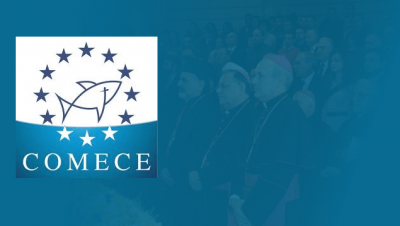
By Sarah Mac Donald - 06 November, 2018
 The Commission of the Bishops‘ Conferences of the European Union (COMECE) has produced a new reflection paper on the future of work that invites EU members to move towards a common European vision of a decent, sustainable and participative world of work for all.
The Commission of the Bishops‘ Conferences of the European Union (COMECE) has produced a new reflection paper on the future of work that invites EU members to move towards a common European vision of a decent, sustainable and participative world of work for all.
The document, ‘Shaping the future of work’, encourages the EU to shape the digital and ecological transformations of the world of work towards the common good.
It sets out 17 policy recommendations ranging from the promotion of international labour standards and the social economy to special provisions on tax justice and workers in transition.
It invites EU member states to take the ecological and digital transition as an opportunity, and to bring about an economy at the service of human integral development.
“Shaping the digital as well as the ecological transformation of our economy will be a common challenge for European politics. Both trends will transform the world of work, changing our understanding as well as the labour conditions in Europe, and will require the political will and vision to shape the new world of work,” the reflection states.
The document defines work not only as a source of income but as an integral part of human identity. “Work can help people to find their place in society, to foster their personal development and to care for creation by making the common house more fruitful for the next generations.”
Work therefore has an important role to play in people’s life, and the future world of work has the potential to promote decent employment in Europe, the document observes.
The analysis in the second chapter of the document highlights some of the challenges that are undermining the potential of work as a contributor to the common good.
These include a warning that job polarisation is increasing in a number of EU member states as digitalisation and automatisation have created many work opportunities for high-skilled people while putting the routine-task jobs of the middle class at risk.
Another concern is that new, more flexible forms of employment challenge EU labour law and threaten job security of mostly young people, who are left to provide their own social security, health and personal protection.
The line between professional and private life has gradually become blurred: the spread and use of new technologies has increased autonomy, but for many it has also led to an intensification of work, shrinking the space for life in family and society.
Based on this analysis, the COMECE reflection proposes to shape the current trends towards a decent, sustainable and participative world of work for all.
Such a vision, the reflection argues, should build on an economy that serves the integral human development and combines the following characteristics:
1 – This world of work will be decent if it promotes just working conditions, including a dignified family-oriented income and sufficient space for life in family and society.
2 – This world of work will be sustainable if it provides the conditions for a stable and fruitful life of the present and future generations taking into account the ecological dimension of work.
3 – This world of work will be participative if workers and employers can shape together at all levels the conditions of their employment through social dialogue and cooperate in tripartite partnership with the state on the formulation of policies that affect their work.
4 – This world of work will be inclusive if it is centred around the primary goal of full employment and enables every member to take part in society and become a free actor for the authentic development of the society.
The COMECE document is the result of a one-year process of consultation and dialogue started in November 2017.
This process has been carried out together with representatives of the European institutions and Catholic-inspired organisations such as the European Christian Workers’ Movement (ECWM), the International Christian Union of Business Executives (UNIAPAC) and representatives of young Christian workers’ movements in the EU.
Mgr Antoine Hérouard, president of the COMECE Social Affairs Commission, is to officially present the reflection at the forthcoming conference ‘Shaping the future of work – a faith-based contribution to the ILO centenary initiative’ in Brussels on 27 November 2018.
The conference will be attended by 200 representatives of the Christian, Jewish and Muslim faiths as well as distinguished EU and ILO officials.
It is co-organised by COMECE, faith-based partners, the ILO and the European Economic Social Committee (EESC).
It will include the participation of Mgr Jean-Claude Hollerich SJ, President of COMECE, Mairead McGuinness, First Vice-President of the European Parliament, Heinz Koller, ILO Regional Director for Europe and Central Asia, and MEPs Claude Rolin (EPP) and Patrizia Toia (S&D).
The Commission of the Bishops‘ Conferences of the European Union (COMECE) brings together the Bishop delegates from Bishops’ Conferences of the EU’s 28 member states.
The reflection can be read here: https://bit.ly/2Ff5Wmu.